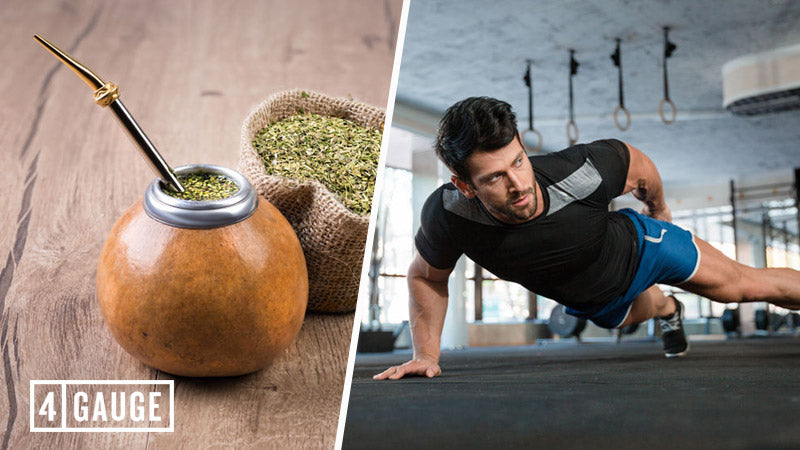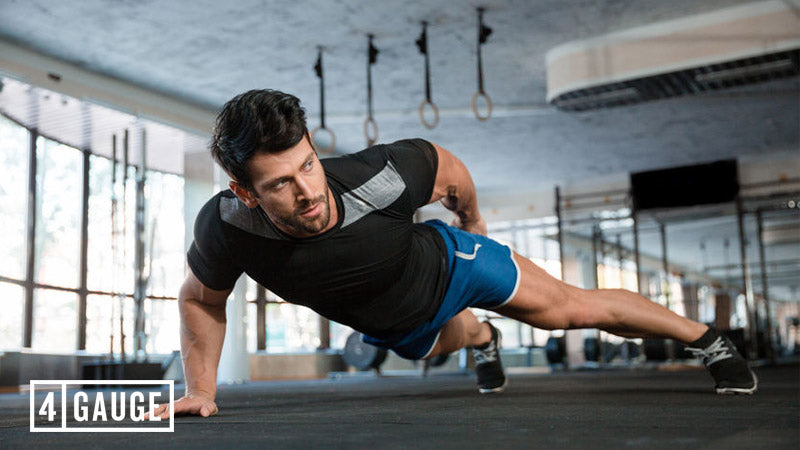Flash Sale!
Buy 3 Bottles of 4 Gauge ELITE,
Get 1 FREE + a FREE Shaker Bottle!
This store requires javascript to be enabled for some features to work correctly.

A good pre workout supplement can make the difference between crushing your gym sessions and only putting a slight surface scratch in them.
And to really make the most of your time under the iron you want the very best supplement.
In this article we take a look at one of the lesser-known pre workout ingredients, yerba mate.
Could it be the key to bigger, better gains? Let’s find out…
Yerba mate is a plant produced mainly in Brazil, Argentina and Paraguay. It is characterized by its white flowers and red fruits and grows as tall as 15 feet when fully aged.
Otherwise known as Illex Paraguariensis, the dried leaves and stem of the plant are often made into a tea which is a popular beverage throughout South America.
The infused tea, or mate, is traditionally enjoyed through a metal straw from a hollowed out gourd or a wooden or sometimes ceramic alternative. It isn’t just an occasional drink in some of these countries, it’s a social tradition too.
Yerba is quite bitter-tasting so is often found blended with other herbs such as citrus.
As with many shrubs and trees, yerba mate contains a number of flavonoids. In this case, these include quercetin, rutin and kaempferol – a nutrient normally found in cruciferous vegetables.
You’ll also find a modest amount of vitamin B1, B2 and C too.
Yerba contains a very small amount of caffeine – around 0.5%. But where it has been marketed as a pre workout isn’t because of its caffeine potential but more to do with its theobromine content.
Theobromine is an alkaloid that stimulates the central nervous system. It has a similar effect to caffeine in that it is claimed to boost focus, motivation and energy levels.
Also found in cocoa products, this compound is said to improve blood flow and enhance muscle function by dilating your blood vessels, helping to deliver more nutrients to your working muscles.
So essentially, theobromine is said to be an effective pre workout because it might boost energy, cognition and increase blood flow.
But does yerba mate actually improve your workouts?
Let’s look at what the research says…

A recent study published in Nutrition and Metabolism [1] found that ingesting 1,000 mg of yerba mate 60 minutes before a cycle power test had no effect on exercise performance.
In the study, researchers recruited 14 men and women who were then randomized into one of two groups. One group were given yerba mate in a capsule, and the other were given a placebo – the exact same pill but with no active ingredient in it.
An hour after ingesting the capsules, each participant was asked to complete an incremental cycling test – one that got progressively harder as time went on. The test finished when the participants couldn’t achieve the pre set speed or stopped out of exhaustion.
The researchers took a few different measurements throughout the test. These included oxygen uptake, power output, blood lactate and respiratory exchange ratio (RER) – a measure of how much oxygen is being taken in against how much carbon dioxide is being breathed out.
There was a slightly promising effect on how much fat was used – just under 25% more in the YM group than the placebo group, but there were no changes to any aspect of exercise performance.
As a pre workout, yerba mate didn’t benefit the athletes at all.
One of the biggest claims made by manufacturers of yerba mate is that it might boost cognition, therefore making it an effective pre workout. After all, a supplement that could ramp up energy, mood and focus would definitely be beneficial when you’re spending time with a heavy barbell.
One study [2] found that even when combined with caffeine, theobromine had no effect on mood or cognitive ability – and if anything might have a negative effect at higher doses.
Published in Physiology and Behavior, the study used 24 female participants to assess the effects of either 700 mg of theobromine, 120 mg of caffeine, or a combination of the two compounds. They wanted to what effect it would have on cognition, mood and blood pressure.
But whilst caffeine had a positive effect on alertness and blood flow, the theobromine supplement had no positive effects at all.

An increase in fatty acid oxidation could be of interest to those who are wanting an effective pre workout that helps them drop body fat.
But unfortunately, the increase in fatty acid turnover doesn’t translate to an increase in metabolic rate.
As we saw in the earlier study of 14 participants [1], yerba did elevate fatty acid oxidation in comparison to placebo.
But does that mean it has a beneficial effect on fat loss?
Not particularly, because there was no increase in metabolic rate to accompany it. Nor was there an increase in energy expenditure.
And in another study, 1.5 g yerba mate extract might have been found to reduce the respiratory exchange ratio in a group of 12 men and women, but it had no effect on overall metabolism or energy expenditure [3]. So whilst it may have suggested a higher proportion of fat being oxidized at first glance, its effects were minimal at best.
The research team concluded that “the results suggested the poor potential of these plant preparations in the treatment of obesity”.
When you look at the potential of yerba mate as a fat burner against something more effective such as caffeine, there really is no comparison.
There may be a worrying link between yerba mate and the development of some upper aerodigestive tract cancers.
One study, published in Cancer Causes and Control [4] found that there was a positive relationship between drinking hot yerba mate and oral cancer. And although the relationship was only borderline significant, it is still an association to be aware of.
Strangely, the development of cancer was more prevalent in those that didn’t smoke or drink alcohol.
An increase in blood flow is inevitably achieved by an increase in heart rate and blood pressure.
But the combined effects of caffeine and theobromine may increase blood pressure to unsafe levels if you suffer from hypertension or have a low caffeine tolerance.
There are much better pre workouts available if you’re wanting to maximize your productivity in the gym. At present there just isn’t enough evidence that it can improve any aspect of physical performance
4 Gauge is an exhaustively researched, all-natural pre workout designed to rip the lid off your gym sessions, sports games or workouts.
Packed with performance-enhancing nutrients such as caffeine, L-theanine and creatine, 4 Gauge will take your training to a completely new level.
